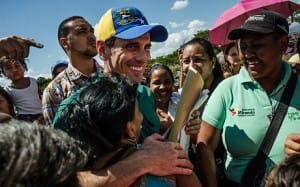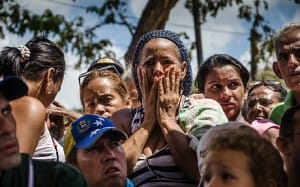
‘Venezuela needs change now – and I am the man to deliver it’
As Venezuelans tire of food shortages and soaring inflation, opposition leader Henrique Capriles tells The Telegraph the time is ripe for change
GUATIRE, VENEZUELA: It is a hot day in the hills outside Caracas, but when Henrique Capriles, the Venezuelan opposition leader, makes his entrance into the slum-village he comes at the run, bounding up a rutted track to be engulfed in a crowd of cheering children and petitioners.
After stopping to jump on a small bouncy castle that has been set up for the children, Mr Capriles emerges from the throng clutching a fistful of letters from the inhabitants of Cielo Valle, a clutch of crude, brick-built houses perched on a lushly-forested hillside.
The supplicants make various requests – a bulldozer to dig a road, a deeper well for clean water, more reliable electricity, better drains for the rainy season, a new sports field – but above all else they say they want one thing: change.
Governor Henrique Capriles receives letters asking for help from consituents in Guatire (Meridith Kohut/The Telegraph)
The unanswered question is whether Mr Capriles, a 42-year-old state governor who has lost two presidential elections in Venezuela in 2012 and then in 2013, is the man to deliver it.
Like it or not, the current collapse in world oil prices is already delivering brutal change to Venezuela, tanking the country’s ability to raise the dollars it needs to pay for imports of even basic foods and medicines.
Supermarket shelves are increasingly empty, hospitals are sending curable patients home to die for lack of medical supplies, inflation is now running close to 100 per cent and market analysts predict that the Venezuelan government could default on its debts before the year-end.
“Change? Of course there can be change,” a fiercely animated Mr Capriles tells The Telegraph after three hours spent listening patiently to the grievances of the people. “This is the year when power will be decided in Venezuela.”
Although presidential elections are not due for another four years, parliamentary elections must take place before December, giving Venezuela’s fractious opposition parties a fresh chance to confront the dismal record of the ruling United Socialist Party.
Under mounting pressure the country’s president, Nicolas Maduro, has appeared increasingly erratic. This week he accused Joe Biden, the US vice-president, of «personally» plotting to overthrow his administration. The US responded by calling the allegations «patently false», while slapping visa sanctions on forty-three Venezuelan officials accused of human rights violations and corruption offenses.
Jorge Giordani, Mr Maduro’s former finance minister who was sacked last year, said in an interview that Venezuela was rapidly becoming «the laughing-stock of Latin America.»
With public discontent deepening by the day – opinion polls show Mr Maduro has an approval rating of just 20 per cent – Mr Capriles believes the time is now ripe.
Henrique Capriles greets supporters in a slum in Guatire (Meridith Kohut/The Telegraph)
“In politics, timing is everything. Last year there was a call for political change but the government had support because oil prices were still high,” he says. “Today, eighty per cent of the country wants change. The crisis we are experiencing has reached a critical point.”
Even so, it remains unclear whether the Venezuelan masses who hitherto turned out in droves for Hugo Chavez, who showered them with billions of dollars in social programmes, are now ready to switch allegiance to a new man, and new way of governing.
To be successful, opposition groups will also have to counter a government clampdown on media criticism and the abiding nostalgia for all things Chavez, according to 80-year-old Robert Bottome of the VenEconomia group who is a long-standing observer of Venezuelan politics.
“The problem is that too many people seem to blame the current crisis on Maduro, and not the policies that actually caused the crisis, which belong to Chavez,” he said.
Attendees listen as Henrique Capriles holds a community meeting (Meredith Kohut /The Telegraph
But if parliamentary elections go well, Mr Capriles hopes they could provide the launch-pad for a presidential recall referendum that under Venezuela’s constitution requires the signatures of 20 per cent of the registered electorate.
Mr Chavez faced just such a referendum in 2004, but defeated it easily. Mr Maduro is much more vulnerable.
Officially Mr Capriles lost the 2013 election to Mr Maduro by 1.5 per cent or 223,000 votes, a surprisingly narrow margin given the groundswell of affection for Mr Chavez that followed his death. Mr Capriles still disuptes the result.
“I only lost once,” he says, conceding to his 11-point defeat to Mr Chavez in 2012. “I didn’t lose the election to Maduro, I’m very sure about that. They never gave me the opportunity to demonstrate that I won.”
Despite his obvious energy, questions remain over whether Mr Capriles and his Justice First party, or any other of four or five senior Venezuelan opposition leaders could rally the country against the current regime.
A year ago popular discontent boiled over in a wave of riots that left 43 people dead and 3,000 arrested, including Leopoldo Lopez, the leader of the Popular Will Party who remains in jail following a heavy-handed government crackdown.
Mr Capriles, a devout Catholic and lawyer who was criticised in some quarters for failing to back the 2014 protests, believes that too many people are too fearful to take to the streets in the numbers required to force change.
Henrique Capriles holds a community meeting in a slum in Guatire (Meridith Kohut/The Telegraph)
Only last week, in what was widely read by opposition groups as a thinly veiled warning to any potential protesters, the government announced it had passed an ordinance allowing police to use lethal force against demonstrators.
But Mr Capriles is adamant that change can – and will – come through constitutional, non-violent means, and that given the scale of the crisis now confronting the country, the opposition can deliver it.
“The opposition will unite. Faced with national problems, our differences are irrelevant. The country is like we have had a natural disaster, this is the situation the country is entering into,” he says.
“The country can’t go on like this. If people are spending all day in a queue, when will the people work? How can the country produce anything?” he adds. “I will not go along with anything that is not within the constitution. But is change possible? Of course it is.”
The alternative, which remains a distinct possibility according to Mr Bottome of VenEconomia, is a slow death.
“It’s what I call the North Korea scenario,” he said at the Caracas office space which is shrinking along with the international client-base for his analyst reports. “We get more of the same, with or without Maduro, and Venezuela sinks deeper and deeper into the mess.”




